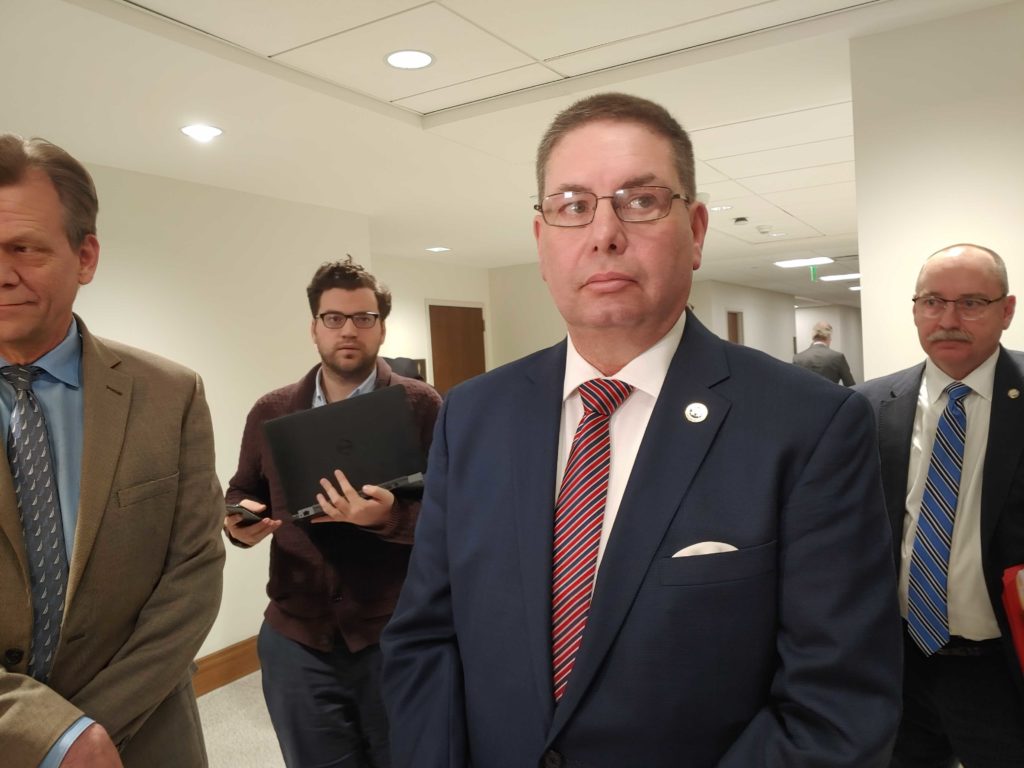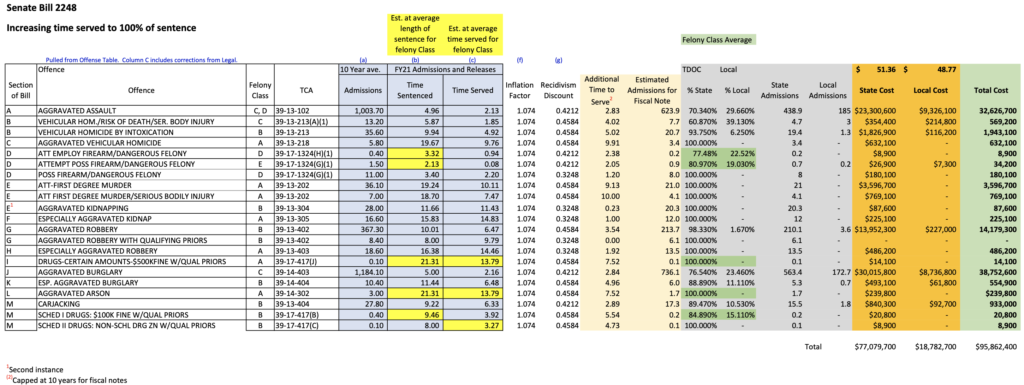
The state legislature is considering a few different bills dealing with criminal justice. This one (HB2656 / SB2248) would require people convicted of certain crimes — ranging from murder to some cases of drug dealing — to serve 100% of their sentence, with no chance of early release.
The legislation has widespread Republican support, including from the leaders of both the House and Senate. But former Tennessee Department of Correction Commissioner Tony Parker says keeping people in prison for longer could have unintended consequences.
WPLN criminal justice reporter Samantha Max sat down with This is Nashville host Khalil Ekulona to unpack the so-called “truth in sentencing” bill. Below is a transcript of their conversation. You can click through the embedded hyperlinks for more background on this topic.
KE: So, truth in sentencing sounds like some legislative jargon. What does this actually mean?
SM: So, what it really means is that the sentence that a judge hands down to you is the sentence you’re actually going to serve. This is something that, you know, started actually — it became much more popular — back in the 1990s where we had the tough on crime movement. We had the crime bill, which actually told states that if you require people to serve at least 85 or 100 percent of their sentence, that you can get federal funding. So, a bunch of states across the country passed these so-called truth in sentencing bills.
And that means that there’s no parole; there’s no credits for good behavior. But then after that happened, we started to see prison populations really just exploding. So, since then, a lot of states have moved away from it, and they’re relying more on different programs that can reduce the number of people that are in prison and make sure that people have a chance for early release.
But here in Tennessee, we are actually potentially moving in the opposite direction. We’ve got a governor who ran on a platform of criminal justice reform, and he put together a task force shortly after he took office to kind of study the state’s prison program. And that found that, for the last decade before 2019, the prison population was actually growing even as other states’ were shrinking. And that was because people were spending a longer amount of time in prison.
So, the idea was to rewrite the sentencing code to help that. But instead, the leaders of the House and Senate are sponsoring a bill that would require people to serve 100% of their sentence for many crimes ranging from homicide, aggravated assault, even some drug crimes.
Khalil Ekulona: So, you recently sat down with Tony Parker, who served as the commissioner of the Department of Corrections up until last year. What did he have to say about this?
Samantha Max: So, Tony Parker is pretty concerned. He was the commissioner of the Department of Correction for five years and spent almost four decades working for the state’s prison system. So, he knows what goes on in prisons. And he’s worried because he says that the work that you have to do inside a prison to keep things running and to try to help people.
It’s tough work. You want people to come in and not just be punished day in and day out for what they’ve done, but to participate in programs like anger management classes, addiction treatment, maybe taking a high school class or a college class. But a lot of the time people are doing those programs because it is helping them get out early. Sometimes, to get parole, you actually are required to take these courses, or sometimes, it just helps you get credits to shorten your sentence.
So, without that incentive, Parker and a lot of others are worried that people just aren’t going to want to participate. And that means that you have people sitting around doing nothing. Things might get violent or just coming out of prison at the end of their sentence with less programing to help them.
Here’s what he had to say:
Tony Parker, former Department of Correction commissioner: Being able to incentivize positive behavior and programing inside our prisons is key. It works. It works in other states. It works in Tennessee. It’s been working in Tennessee. We’ve been able to reduce the number of our recidivism, number for people coming out of TDOC prisons, significantly over the last four or five years, and it’s directly tied to the programs that we offer people to change their habits, change the way they think.
KE: Is he right? Have the numbers been improving?
SM: So, just a quick fact check on that. We still don’t have the most recent numbers from last year. But if we look back over the past five years, there has been somewhat of a drop. So the people that were released in 2013, only 40 percent of them ended up going back to prison within three years, five years later. The most recent numbers that we have, that number had dropped to 36 percent, so it’s small but moving downward.
KE: OK, so then what’s the argument for truth in sentencing?
SM: So, the argument for it, it’s mainly to help victims when someone has harmed you or someone that you love. You want to know what is going to happen to the person who caused that harm, how long they’re going to spend in prison.
And right now, the formula that we have to calculate when someone is actually going to be released is very complicated. And it’s — even if someone receives like a 10-year sentence, a 20-year sentence, whatever it might be, it’s really difficult to know exactly when they’re going to get out.
So, part of it is to give victims some peace of mind so that they know how long the person is actually going to be in prison and so that they don’t have to keep going before the parole board, every time that someone asks for parole to have to relive their trauma and say, “Please don’t let this person out.”
But the other thing is just that it’s, you know, it’s complicated, and they want to be able to have something that’s a little bit more straightforward. And it’s also a way for people that want to say to their constituents, “I’m tough on crime.” It’s a good thing to put on a campaign platform as well.
But on the flip side, you know, Parker worries that early release could actually make people who leave prison come out in a worse place than they started and potentially harm more people or cause more victims if they’re not getting the programing when they’re actually in prison to help them once they get out.
Tony Parker, former Department of Correction commissioner: Do you want someone moving in next door to you that has served 100 percent of their time, right? It sounds good on the front end, but at the end of the day they’ve gone and received very little programing, no incentives to change the conduct, and they’re released without supervision into the community. Or do you want someone who has completed drug and alcohol therapy, anger management and has a vocational trade where they have a meaningful job that moves in next door? That is the key.
SM: So, these programs would still be available to people in prison, but there would just be less of an incentive for people to actually join these programs. So, that means people are going to be leaving prison potentially less prepared.
In the meantime, prisons could become more dangerous if you have people just sitting around with nothing to do. They might turn to violence instead.
There are other potential consequences. It would cost a lot of money. The General Assembly was originally estimating that this would cost about $40 million a year as the prison population grows. The Department of Correction, they sent me estimates that 10 years from now, once the prison population has really grown, this could cost the state $96 million every single year to incarcerate all the extra people. That’s almost $100 million.
 Courtesy Tennessee Department of Correction
Courtesy Tennessee Department of Correction The Tennessee Department of Correction says it would cost a combined $96 million to local and state governments to implement the proposed “truth in sentencing” bill.
Plus, the state is already experiencing a very severe staffing shortage in its prisons. So, if you’ve got more people behind bars, maybe even having to build more prisons, that would just exacerbate the problem.
KE: So, money is one part of this debate, but it seems that at the heart of this, it’s a philosophical question about crime and public safety. And I’m sure you talk about this often with a lot of your sources. What is the point of prison and serving time?
SM: I mean, people disagree on that. But you know, many of my sources, they acknowledge that if someone has caused harm, you have to do something to make it right.
Victims want to feel safe. They want to feel a sense of justice. But the way to get that people disagree on. So, our best hope is just to make sure that people are getting the programing that they need and helping as many people as possible. And Tony Parker doesn’t think that truth in sentencing will really accomplish that.
Tony Parker, former Department of Correction commissioner: You know, they’re away from their family. I get that they’ve committed a crime. There’s a penalty they have to pay, and that’s going to a place where it separates them from society. But the job and the true mission of corrections is to take that person from day one and focus on reentry, because ninety five percent will be returning to a community that we all live in and love and want to make sure that we take care of. The best way to do that for a correctional employee is to use the tools that you have, the incentives, the programs and prepare that person to reenter society. When you manipulate that formula and take away the tools, it’s not good for public safety — absolutely not.
KE: Pretty unambiguous right there. So Sam, tell me what’s next?
SM: Next, it’s got to pass through a few more hurdles, got to pass through a few more committees. Next, I think it’s going to the Senate’s Finance Committee, and then, we’ll see where it goes from there.
But, it’s unclear if the governor would actually support this legislation. He has not committed to it one way or another. So, we’ll just have to see if it gets passed and if so, whether the governor would actually sign it.


